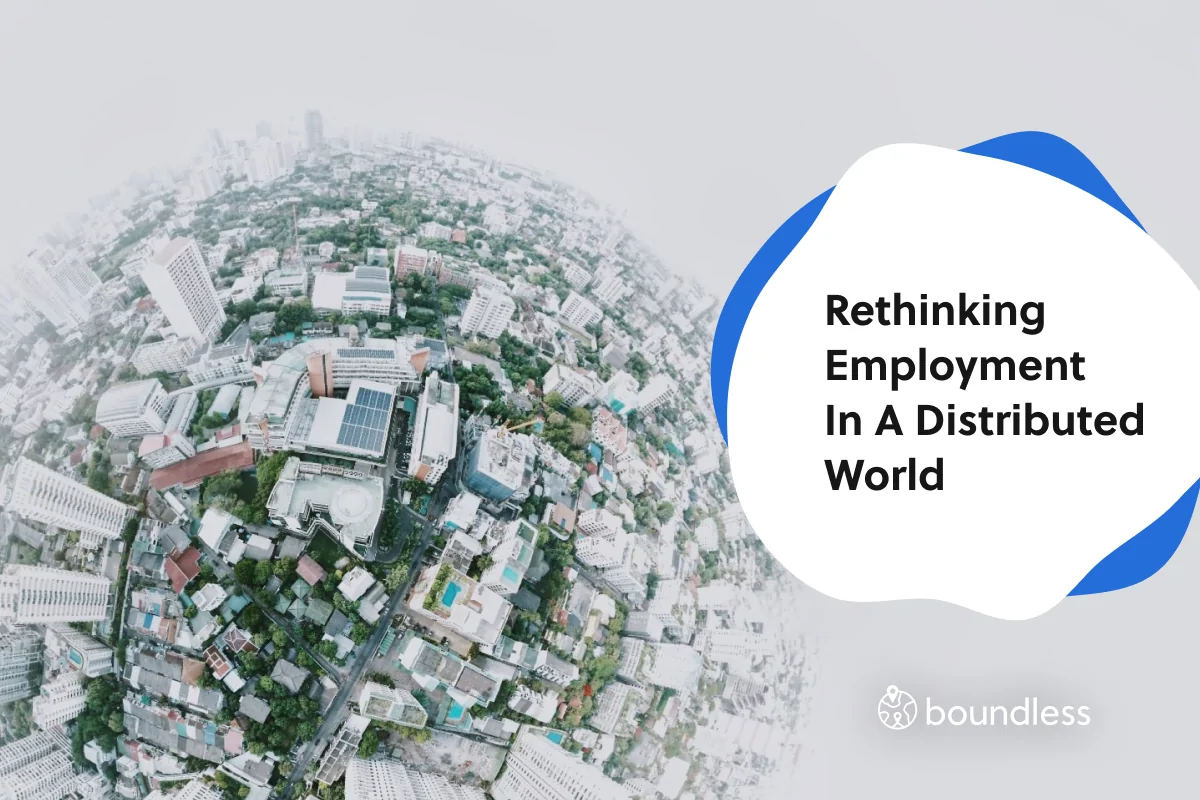What is an Employer of Record?
An Employer of Record (EOR) is a company that helps companies to legally hire and employ workers residing in countries other than where the company is based by acting as the local legal employer. Because employment laws, taxation, benefit requirements and employee rights vary widely from country to country, it’s paramount to have an expert local legal employer such as an EOR to manage a company’s cross-border employment. This includes everything from local employment agreements to statutory rights and benefits as well as updates on local legislation.
At their core, EORs help organisations looking to hire abroad delegate the responsibility of navigating unfamiliar legal systems and ensuring they remain fully compliant with local employment and tax laws. They also help preserve and manage employees’ benefits, rights and feelings of equality with the HQ team members. This partnership allows a business to minimise its responsibility of employing workers from a legal perspective and instead, shifts that responsibility to the EOR.
This means the EOR manages everything from paying international employees to administering and tracking statutory benefits. The EOR manages and files local employee taxes and offers guidance on many legal-related employment issues.
When companies employ the help of an Employer of Record, they sign a commercial agreement and become the client of the EOR. The worker being hired signs an employment contract with the EOR and becomes an employee of the company through the EOR. Depending on local laws, this may be a two-party contract between only the employee and the EOR or a three-party employment agreement that includes the company. Depending on the country, there may be additional agreements and documents that must be signed by all parties. These contractual agreements can be permanent or fixed-term, depending on certain circumstances or a particular country's employment regulations.
Quick Note: You might hear the term Professional Employer Organisations (PEO) used interchangeably with EORs. While there are many similarities, a PEO and EOR are not the same. We’ll continue to discuss the ins and outs of an EOR here, but you can read about the differences of a PEO here.
Why do companies work with an Employer of Record?
Wouldn’t it just be easier for a company to employ workers directly instead of hiring a 'middle man' like an EOR?
Not necessarily.
Every sovereign nation has vastly different tax laws and employment regulations. When businesses decide to hire from abroad – for example, they may want to hire workers from location markets where they don’t have an existing presence – they have to navigate through an unfamiliar legal and tax system. An EOR, on the other hand, specialises in understanding these systems and ensuring their clients and their employees remain legally compliant with all regulations and laws.
More often than not, managing all these moving parts requires a lot of time, resources, and expertise a given company may not have to spare. Working with an EOR is an easier and more cost-effective way for businesses of any size to employ people from abroad. It ensures compliance with local employment and tax laws which can be costly to keep track of (and even more expensive if mistakes are made and fines are applied).
Working with an EOR is the best solution for companies looking to hire abroad because it best protects and supports each party and their concerns: The employee can be certain their employment, pay, and benefits are responsibly managed; the company can continue focusing on growth without worrying about understanding local employment compliance in jurisdictions they have no physical presence.
Why can’t a company hire workers as full-time contractors?
In years past and to this day, companies sometimes tackle the challenges of global employment by hiring overseas workers as full-time contractors. This has allowed them to skirt around many tax and legal employment issues. However, it also led to rampant problems, like a loss of benefits and protection rights for employees.
Unlike an employment agreement that requires an organisation to uphold legal responsibilities – such as consistent payment, benefits, and other government-mandated statutes to protect workers – a contract agreement is simply an exchange of goods or services for a flat fee without those all-important protections. There are few worker protection rights for people hired and classified as contractors versus people hired and classified as employees.
As a result, hiring full-time contractors is illegal in much of the developed world. Companies that choose to forgo these laws and employ full-time contractors can face major financial penalties and even jail time if they’re caught.
How does the Employer of Record (EOR) model work?
An Employer of Record model creates a triangular relationship between an organisation, employees, and the EOR.
In most cases, the company and the employee being hired sign a three-way agreement with the EOR. This contract, carried out and provided by the EOR, ensures the business stays locally compliant with all tax and employment laws and that the employee retains their rights and benefits.
After all parties have signed, the EOR becomes the legal employer of the person being hired. Thus the EOR takes on the responsibility of adhering to governmental, tax and employment authorities. The organisation hiring the EOR pays a fee for this service relationship and covers the cost of the employee’s salary and other financial dispensations – all payable to the EOR, which is then disbursed directly to the employee.
This means the Employer of Record handles payroll and issuing payslips, salary payments, and other monetary-value benefits; preparing employment-related taxes and filing tax returns; and all other legal or employment tax-related issues.
While the EOR is the legal 'on-paper' employer of the worker, the company maintains responsibility for finding, recruiting, interviewing, and hiring employees. Once they’ve extended a job offer, they are still in charge of all the non-legal parts of their relationship with their new employees. The EOR does not handle in-house working relationships, tracking employee performance, conducting performance reviews or tracking the time the employee has worked.
An overview of how responsibilities are split will usually be outlined in a commercial agreement that the customer and the EOR sign. In some countries, there will be additional agreements to sign necessary for more country-specific aspects of employment.
What is an Employer of Record platform?
An Employer of Record would likely have a platform that enables both employers and employees to have access to an employee’s personal data. It’s where employees may upload all personal details needed for their contract, where they may access their contract and payslip and where employers may approve monthly payroll, among other things. However, the existence of such a platform is not a certainty and some providers still use a combination of spreadsheets, emails, and so on.
At Boundless, we built our own platform where the original onboarding of an employee takes place: Employees add the information we need to sign their contract and run their payroll, and employers can review the monthly payroll, benefit allowances, and access information about their employer obligations in a certain country. It’s also where the employees access their payslips each month and where they submit receipts if their employer has enabled flexi benefits.
As a legal employer, the Employer of Record collects and stores employment-related documents. If working with Boundless, after an employer signs up for our services, the worker is invited to create a profile and provide a few necessary personal details on our platform. These include legal name, address, date of birth, bank information, tax details, marital status (for tax purposes) and visa or work permit information if they are living in a country where one is needed.
At Boundless, we require employees to create their accounts using a personal email address so that even after they are no longer working for the same company, they will have lifetime access to their data and documents, such as payslips.
Boundless is an Employer of Record
Looking to expand your team across borders but not certain about the process? Boundless can help. As an Employer of Record, we handle tackling the most complicated parts of hiring talent abroad so you can focus on running your business.
Reach out to an EOR expert now to learn more.


